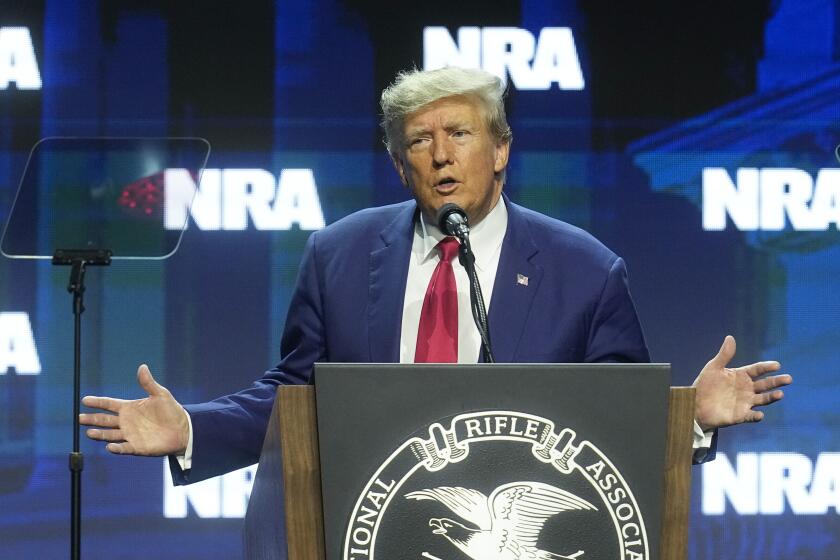Editorial: Campaign 2016: Candidates need to say more about the U.S. role as the world’s policeman
When the topic turns to American military intervention in other countries, political candidates of sometimes widely differing views like to assert that the United States “shouldn’t be the world’s policeman.”
It’s a clever catchphrase, but what does it mean? That the U.S. shouldn’t ever intervene militarily in foreign conflicts? That it should do so only when vital U.S. interests are at stake or an ally is under attack? What about situations in which military force might be necessary to protect civilians or prevent genocide? Does it mean that the U.S. should no longer maintain a large military establishment to deter attacks on allies or that it should ask them to shoulder more of the burden of their own defense?
In his seven years as president, Barack Obama — rightly in our view — has taken a significantly more skeptical view of military intervention than his immediate predecessor, a natural reaction to the protracted conflicts in Iraq and Afghanistan that cost almost 7,000 American lives. Where he has ordered military action — as in the war against Islamic State or the ill-fated operation that led to the overthrow of Libya’s Moammar Kadafi — he usually has done so in concert with other nations. He has sent mixed signals about whether military intervention can be justified purely on humanitarian grounds, though he cited such grounds in defending both the Libyan operation and the early stages of the air campaign against Islamic State.
Obama’s desire to avoid combat is clear. Even as he ordered air strikes against Islamic State and dispatched special forces to Iraq, he ruled out using U.S. troops in “enduring offensive ground combat operations.” His persistence in negotiating an agreement to place restrictions on Iran’s nuclear program was motivated in large part by a desire to make military action against Iran unnecessary.
At the same time, though, the administration has sought to support U.S. allies in Europe and Asia in the face of aggressive actions by Russia and China, proposing that U.S. forces be rotated into NATO countries in Eastern Europe and ordering patrols by U.S. vessels in the South China Sea. Obama has submitted a proposed Defense Department budget of $582.7 billion. U.S. forces continue to be stationed around the world, including in Japan, Germany and South Korea, where their presence serves as a symbol of U.S. support for its allies.
[Obama’s] administration ... has continued to “police” potential international conflicts; in today’s world, it has no choice but to do so.
So while Obama may be less interventionist than George W. Bush, his administration also has continued to “police” potential international conflicts; in today’s world, it has no choice but to do so. But what of the candidates running to succeed him?
Although he is short on specifics about foreign policy, Sen. Bernie Sanders touts his opposition to the 2003 invasion of Iraq and warns that Hillary Clinton, who voted to authorize that operation, might lead the U.S. into another war. Sanders says that although he is “absolutely prepared to use force” if necessary, he wants other countries to know that they can’t “just call up the American military and the American taxpayers” and have U.S. troops come to the rescue. Clinton, although she opposes deploying U.S. combat troops against Islamic State, rightly refused at a town hall to promise a voter that she would never “expand our military involvement abroad.” She is widely viewed as more willing than Sanders to use force to right wrongs around the world.
On the Republican side, Sen. Ted Cruz has said that the U.S. “should do what is necessary to win” in the war against Islamic State — which does seem to leave open the possibility of ground troops — but he also has criticized Clinton for her role as secretary of state in pressing for the 2011 military campaign in Libya. For Cruz, the U.S. shouldn’t play policeman if the mission is to oust oppressive leaders such as Kadafi and Syria’s Bashar Assad whose overthrow might be followed by something worse.
Ohio Gov. John Kasich is open to committing U.S. ground forces to fight Islamic State. But even Kasich doesn’t see U.S. troops as the preferred instrument of U.S. foreign policy.
Then there is Donald Trump. Trump wants to lay down the policeman’s billy club — by curtailing U.S. support for NATO and withdrawing U.S. forces from Japan and South Korea if those nations don’t pay more for their own defense. Trump has also has suggested that the U.S. should “let Syria and ISIS fight. What do we care?” — though on another occasions he indicated that he might deploy boots on the ground to “knock the hell out of them.” In national security policy, as in other areas, one looks in vain for consistency (or caution) with Trump.
This page has laid out some of the criteria U.S. presidents should seek to meet before going to war (other than in cases of invasion or to defend an ally). The provocation must be severe enough to justify putting American lives at risk; alternatives to combat should be exhausted first; allies should be carefully vetted; the U.S. should seek multilateral support and cooperation, and goals should be narrowly tailored, definable and achievable.
Not only Trump but other candidates need to be more specific about the circumstances under which they would use — or refuse to use — military force. Saying that the U.S. can’t be the world’s policeman is only the beginning of the discussion.
Follow the Opinion section on Twitter @latimesopinion and Facebook
More to Read
A cure for the common opinion
Get thought-provoking perspectives with our weekly newsletter.
You may occasionally receive promotional content from the Los Angeles Times.










